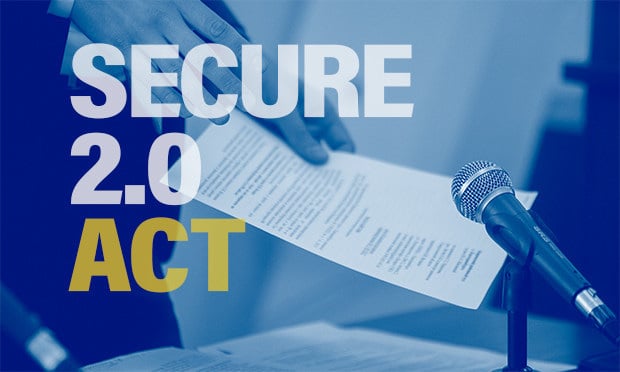 SECURE 2.0 Act
SECURE 2.0 Act
Although the sweeping SECURE 2.0 Act is now in effect, the devil remains in the details.
The National Association of Government Defined Contribution Administrators sent a letter to the U.S. Treasury Department March 27 asking for clarification of several provisions. Association members oversee plans for participants from 60 state and territorial government entities and 146 local government entities, including counties, cities, public safety agencies, school districts and utilities.
Recommended For You
The letter, which was submitted to officials in the IRS and the Treasury, seeks guidance in four specific areas:
- Catch-up contributions. "First, we ask that the IRS and Treasury confirm that the amendment to Code section 457(e)(18)(A)(ii) found in SECURE 2.0 section 603(b)(2) concerning `designated Roth contributions' was not meant to distinguish between how this limit is applied based on whether a participant contributes pretax or Roth contributions to a 457(b) plan. Second, we ask that the IRS and Treasury utilize its regulatory authority to provide effective date or other relief for the requirements set forth in SECURE 2.0 section 603(b)(1)."
- Required minimum distributions. "Most recordkeeping systems continue to have delays in implementing the increase to an age 73 required beginning date, which triggers changes in rollover eligibility, rollover notices and distribution processing. Given these delays, we ask that the IRS and Treasury provide guidance allowing governmental plans to notify participants by Sept. 30, 2023, of their right to roll over funds prematurely distributed based on an age 72 instead of age 73 required beginning date."
- Part-time workers. "We ask the IRS confirm through guidance that the addition of long-term, part-time employee eligibility rules in SECURE 1.0 and SECURE 2.0 does not require a governmental 401(k) or 403(b) plan to make new classes of employees eligible for their plans."
- ERISA incorporation. "We respectfully request that any guidance makes it clear that governmental plans are not required to comply with ERISA, even if some ERISA provisions are incorporated into the code by reference."
Related: SECURE 2.0: Year-by-year breakdown for employers and plan sponsors
"The need for guidance on these topics is especially urgent for governmental plans, because they often face complexities in local law enabling requirements, payroll systems and administration that most private sector employers do not," association president Matt Petersen wrote. "Further, although Congress provided for delayed governmental plan amendment deadlines, because Congress did not explicitly provide for delayed effective dates for governmental plans, many of our members now face implementation deadlines that fall far earlier than they are procedurally able to address under local laws."
© Touchpoint Markets, All Rights Reserved. Request academic re-use from www.copyright.com. All other uses, submit a request to [email protected]. For more inforrmation visit Asset & Logo Licensing.







